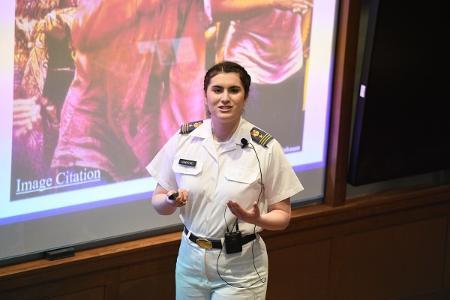Handford Researches Psychedelic Drugs on Betta Fish

Gabriella Handford ’24 discusses her research in Scott Shipp Hall. –VMI Photo by Kelly Nye.
LEXINGTON, Va., March 21, 2024—When one hears of psychedelic drugs, such as LSD or psilocybin, mental images invoked may include free spirits high on hallucinogens and perilously close to stepping off a high precipice unaware of surrounding dangers, or addicts experiencing dissociative delusions and lashing out to innocents around them. However, psychedelic drugs have been used to the benefit of patients with alcohol disorder and in talk therapy sessions. Research continues to look for additional benefits, and currently hundreds of studies are being done on psychedelics in major research institutions.
Gabriella Handford ’24, a cadet majoring in biology at Virginia Military Institute, recently presented her honors research thesis, “Effect of Psychedelic Drug Therapy on Male Betta Splendens Aggression as Compared to Traditional Pharmaceuticals.”
According to Handford, a psychedelic drug activates the serotonin receptor (a “docking port” for serotonin molecules) and changes the perception of reality and consciousness.
In her experiments, Handford focused on the psychedelic drug, 251-NBOMe, in which very little research has been conducted. It was first made for research purposes in 2003, then began to be used for recreational purposes in 2010. “It’s very potent, acts like LSD, and sometimes sold as LSD, which is dangerous because of the strong visual hallucinations it causes not usually associated with LSD, and more dangerous because there’s a very thin threshold between a high dose and an overdose,” she stated. She chose to use betta fish as her study subjects because they have the same serotonin receptors as humans. Additionally, betta fish are overly aggressive, providing better aggressive behavior to study, and aggression plays a role in some psychiatric disorders, such as bipolar mania and schizophrenia. Serotonin is associated with good moods, and high levels of serotonin are linked with low levels of aggression. Conversely, low levels of serotonin are responsible for depressive symptoms.
Handford’s hypothesis in her research was “Bettas exposed to psychedelic drug therapy will be less aggressive than their untreated counterparts. Similarly, the bettas that underwent psychedelic therapy will have a similar aggression response to the fish that received traditional psychiatric medications.”
In her experiments, Handford placed randomly selected male betta fish in clear cups filled with water mixed with one of three different drugs: Paroxetine (a traditional prescription medication used to treat depression by increasing the time serotonin spends in the synapse), clozapine (an FDA-approved antipsychotic used to treat schizophrenia), and 251-NBOMe. Additionally, some fish were placed in cups with a combination of paroxetine and clozapine, others in pure water, and still others in water mixed with methanol. Over the course of 22 days, she observed them in three behavioral tests: two aggression scenarios, (two fish — each in their own clear cup — facing each other), and one solo behavior. The fish were dosed with serotonin between aggression tests, their behaviors videoed, and the water preserved for later analysis.
Handford found that while not to the extent of the traditional serotonin drugs, the psychedelic drugs presented significant changes in behavior, and suggested that additional research should be conducted.
Handford’s advisor, Maj. Molly Kent, assistant professor of biology, has worked with her all four years of the study. “Throughout that time, Gabby has shown a strong work ethic and drive to discover more about the field of neuroscience. She created her honors thesis on her own with little input from me as her mentor. She was able to identify pitfalls and troubleshoot her project like a mature scientist would. Her final product demonstrates her passion for neuroscience and education. She used her final oral presentation as a way to educate others about treatments for depression within the field of neuroscience. Watching Gabby grow and mature into the scientist she is today has been a joy. I am excited to see where her research career will take her once she starts graduate school in the fall,” said Kent.
Handford is the daughter of Jennifer and Kevin Handford of Middleburg, Virginia. She is an alumna from Wakefield High School in The Plains. After graduation, she plans on entering a PhD program.
Marianne Hause
Communications & Marketing
VIRGINIA MILITARY INSTITUTE
.svg)
.png)